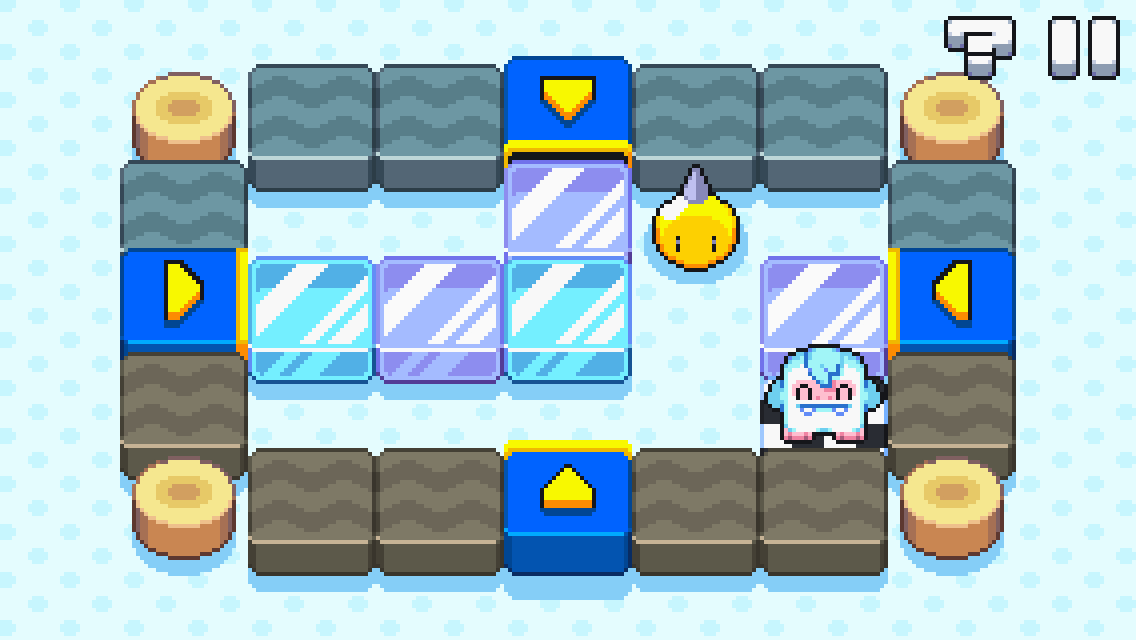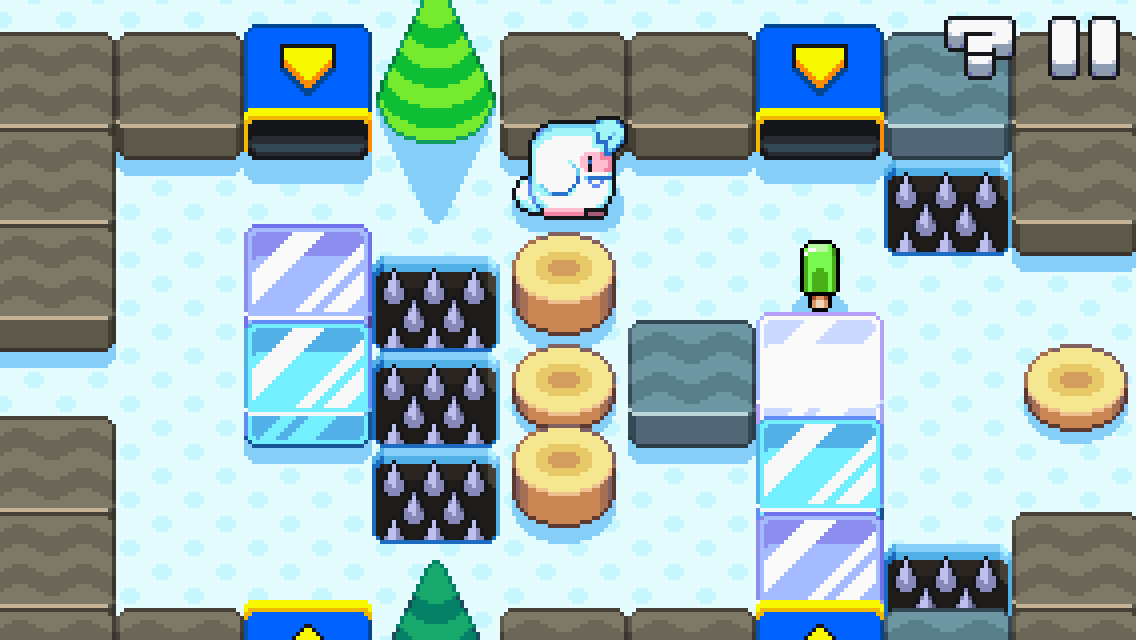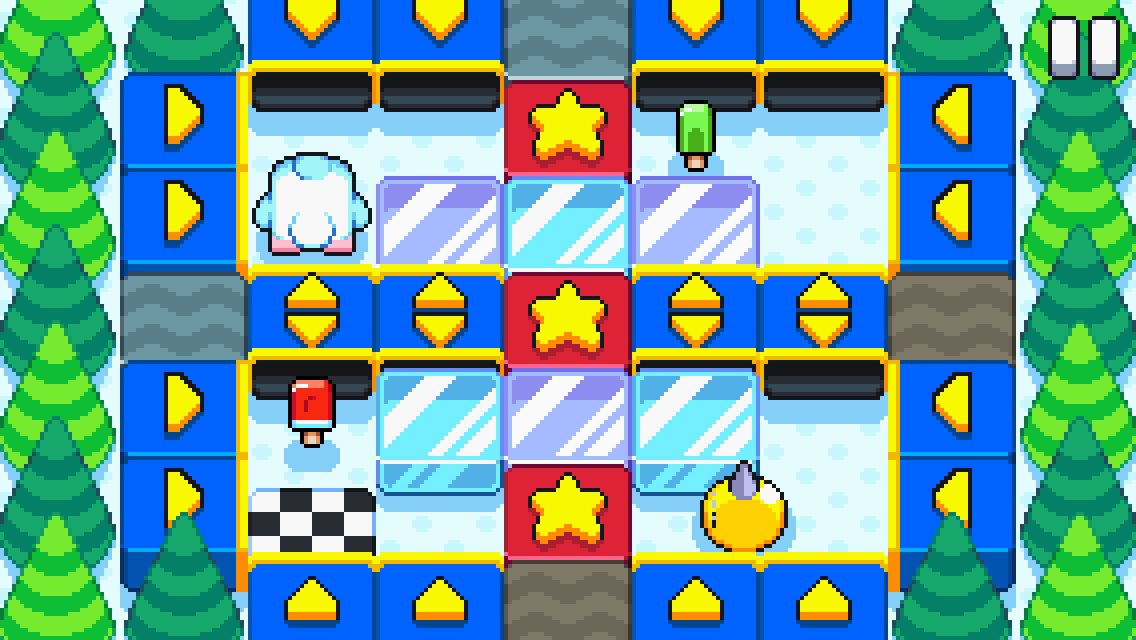 It’s always a bit of a gamble to take direct control of the main character of a game out of the player’s hands. When it works, it can force the player to pay attention to things going on outside of the area they’re currently focused on, which adds some welcome complexity. When it goes off the rails, it can leave the player feeling incredibly frustrated at losing due to circumstances quite literally out of their control. One genre where it seems to work well, even with somewhat simplistic implementation, is the puzzle genre. Games like Lemmings or the later entries in the Mario Vs. Donkey Kong series show how rewarding it can be to set up a plan and guide it through to its conclusion, even if you aren’t directly playing through it. Lost Yeti ($2.99) takes a similar approach, with its titular character having a mind of his own, wraps it all up in retro stylings, with the end result being a pretty good action-puzzler.
It’s always a bit of a gamble to take direct control of the main character of a game out of the player’s hands. When it works, it can force the player to pay attention to things going on outside of the area they’re currently focused on, which adds some welcome complexity. When it goes off the rails, it can leave the player feeling incredibly frustrated at losing due to circumstances quite literally out of their control. One genre where it seems to work well, even with somewhat simplistic implementation, is the puzzle genre. Games like Lemmings or the later entries in the Mario Vs. Donkey Kong series show how rewarding it can be to set up a plan and guide it through to its conclusion, even if you aren’t directly playing through it. Lost Yeti ($2.99) takes a similar approach, with its titular character having a mind of his own, wraps it all up in retro stylings, with the end result being a pretty good action-puzzler.
Lost Yeti is a stage-based puzzle game where you need to guide the Yeti to each stage’s goal, grabbing as many ice treats as possible on the way. The Yeti moves on his own, trudging in a straight direction until he hits a wall, at which point he will always turn right if possible. If he’s boxed in, he’ll take a nap until a path is open to him again. If he hits any dangerous obstacles or enemies, you have to start the stage from the beginning again. He will not try to avoid anything, even if it means his death, so it’s up to you to see him through by manipulating the environment around him.

The game is played from a top-down perspective, with the stages set up somewhat like a grid. In each stage, you’ll be able to move certain rows and columns by swiping on them. Inanimate objects such as ice blocks will move when you do this, but you can’t move a row or column if a living creature is occupying it at the moment. There are 60 levels in total at the moment, and as you play, the game gradually layers on more traps, gimmicks, and enemies. The game starts off relatively easy, but you’ll soon reach stages where, for example, you have to puzzle out a way to get the Yeti to the goal while keeping an eye on spike floors and enemies jumping all over the place.
It’s a very challenging game in the long run, and you need equal parts quick reflexes and a good eye for how to shift the pieces to complete each stage, particularly if you’re looking to collect all of the goodies found within. The difficulty is kind of up and down, with easy levels sandwiched between insanely hard ones fairly often, but thankfully, if you happen to have trouble with a stage, the game will let you skip it and move on to the next one at the push of a button. The game also keeps track of the number of steps the Yeti takes before reaching the goal, with Game Center leaderboards showing off who managed to take the fewest steps for each world.

The aesthetics fall somewhere in that lovely range between 8-bit and 16-bit. The graphics are colorful, vibrant, and cute, and remind me quite a bit of late 1980s-era Taito or Hudson. Everything is pretty big on the screen, so it’s never a problem distinguishing elements. The music is very light and bouncy and suits the action well. Like many good puzzle games, it’s catchy but never annoying. I love the sound the Yeti makes when he reaches the goal in each stage. It’s adorable and definitely adds to the retro feel of the game. The whole thing is cohesive enough that if someone told me this was a lost game from 30 years ago, I’d believe it. The only thing I dislike in terms of the audio/visual experience is that this is yet another game that doesn’t obey the mute switch on your device. I really wish I knew why developers choose to do that.
Lost Yeti is a fine homage to puzzle games of old, while capably living up to the modern era. The mechanics are simple and perfectly designed for a touch screen, but the complexity of the level design ensures the game is more than just a shallow ride. While you’ll start the game just making a clear path to the goal, you’ll soon be having to match keys to locks, chill walking blocks to make them move out of the way, and trying desperately to corral out-of-control enemies. For his part, the Yeti moves in very predictable ways, ensuring that you won’t be frustrated by him choosing to zig when you wanted him to zag. The enemies, too, all have fairly predictable patterns and methods. These things go a long way towards avoiding frustration should you happen to fail. Whenever my Yeti was taken down or an ice treat was lost, it was always a feeling that I should have anticipated that, not that the game was cheating or being random.

It’s a nice puzzle game done up in a classic style, with a good price and no hidden costs jumping out at you. It’s not a terribly long game, but you’ll certainly get your money’s worth from it, especially if you get into trying to clear the stages with the lowest number of steps. If you enjoy puzzle games with a reflex component or are just looking for a little charmer, you might want to search out Lost Yeti. People in our forums enjoyed it quite a bit too, so make sure to head on over there to read a few other points of view on the game.